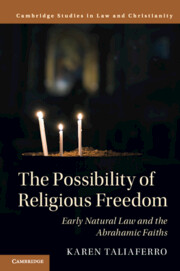Book contents
- The Possibility of Religious Freedom
- Law and Christianity
- The Possibility of Religious Freedom
- Copyright page
- Dedication
- Contents
- Preface
- Acknowledgments
- 1 Religion and Law in Late Modernity
- 2 Antigone: The Tragedy of Human and Divine Law
- 3 Maimonides’ Middle Way: Teleology as a Guide for the Perplexed
- 4 Between Sharīʿa and Human Law: Ibn Rushd and the Unwritten Law of Nature
- 5 Arguing Natural Law: Tertullian and Religious Freedom in the Roman Empire
- Conclusion
- Epilogue
- Bibliography
- Index
2 - Antigone: The Tragedy of Human and Divine Law
Published online by Cambridge University Press: 07 October 2019
- The Possibility of Religious Freedom
- Law and Christianity
- The Possibility of Religious Freedom
- Copyright page
- Dedication
- Contents
- Preface
- Acknowledgments
- 1 Religion and Law in Late Modernity
- 2 Antigone: The Tragedy of Human and Divine Law
- 3 Maimonides’ Middle Way: Teleology as a Guide for the Perplexed
- 4 Between Sharīʿa and Human Law: Ibn Rushd and the Unwritten Law of Nature
- 5 Arguing Natural Law: Tertullian and Religious Freedom in the Roman Empire
- Conclusion
- Epilogue
- Bibliography
- Index
Summary
Chapter Two provides an original interpretation of Sophocles’ Antigone, arguing that the play illustrates the tragic consequences of perceiving law exclusively in its human or divine form. It builds on and diverges from the Hegelian reading of the play, drawing out the role of hubris, as characterized by Creon’s myopic view of law as human fiat, as well as Antigone’s exclusive concern for the gods’ commands, and shows that either form of hubris results in tragedy. To approach justice, the law must instead be conceptualized as not only human and divine but also as natural, for it is natural law that could have mediated the divine and human aspects of the law that clash in the persons of Antigone and Creon. The prudential voices of Teiresias and Haemon suggest how this natural law of justice could inform both Creon’s and Antigone’s views of law and avert the tragedy with which the play necessarily ends. This chapter also takes up the issue of agonistic politics, which some have interpreted the play to illustrate, and shows the peril of this view of politics for religious freedom.
Keywords
- Type
- Chapter
- Information
- The Possibility of Religious FreedomEarly Natural Law and the Abrahamic Faiths, pp. 32 - 60Publisher: Cambridge University PressPrint publication year: 2019

